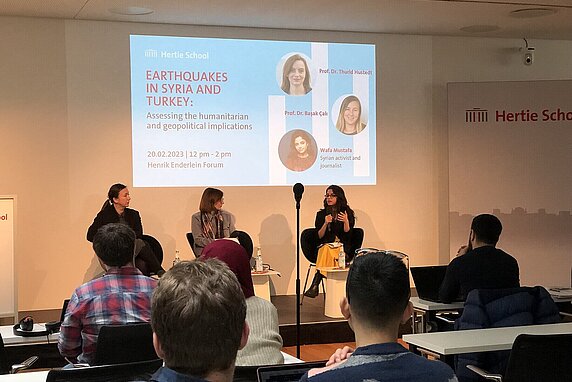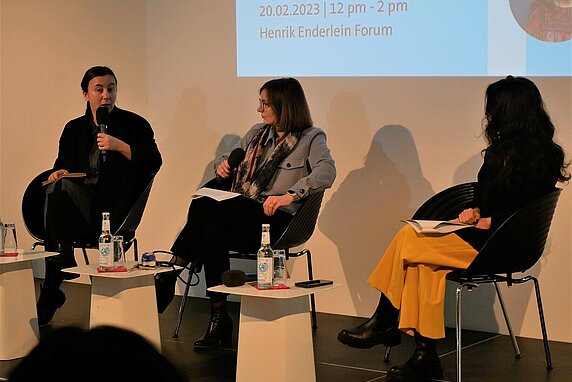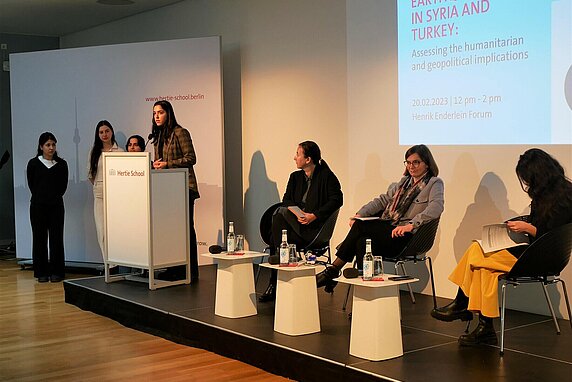Hertie School hosts a panel discussion about the repercussions of the earthquakes in Turkey and Syria.
On 6 February 2023, two major earthquakes hit southern and central Turkey and northern and western Syria, followed by over 7,000 aftershocks. Over 50,000 people have lost their lives, hundreds of thousands have been injured, and multiple cities suffered widespread destruction. On 20 February, the Hertie School hosted a panel discussion on the humanitarian and political implications of this tragic event with Başak Çalı, Professor of International Law and Co-Director of the Centre for Fundamental Rights, and Syrian journalist and activist Wafa Mustafa. Dean of Graduate Programmes and Professor of Public Administration and Management Thurid Hustedt moderated the discussion.
Following the aftermath of the earthquakes, the Hertie School students Melisa Özcelik, Tuna Su Tuere, Georgia Langton and Ranim Munshi formed a humanitarian student initiative to create awareness and provide information about these devastating events. In coordination with Student Life, they supported this event as a kick-off for future panels and initiatives on, for example, the region’s crisis management, humanitarian circumstances and impacts on migration movements.
Response failures in Turkey and Syria linked to political regimes
Both Çalı and Mustafa stressed that the tragedy is not simply in the earthquakes themselves. In Turkey, those affected by the earthquakes reported slow response times and a lack of effective co-ordination between emergency responders and provision of technical equipment to free people trapped in collapsed buildings. According to Çalı, these shortcomings were, in part, due to the government’s failure to put robust systems for emergency relief management in place and its centralised approach to power. Çalı also criticised the lack of effective regulation of the construction sector. “Everyone knows that it’s buildings and not earthquakes that kill people. The construction-driven growth model has been fuelled by a lack of regulation and control,” she explained.
In Syria, the severity of the earthquake was exacerbated by over 10 years of war. The earthquakes came after years of Syrian and Russian bombardment of the region which had already damaged or destroyed at least 65 per cent of north-western Syria’s infrastructure. Humanitarian aid in this region was already insufficient before the earthquake – according to Mustafa, not even 60 per cent of nutritional needs were met last year. After the earthquakes hit, no aid could reach Syria via Turkey for the first three days.
Do the United Nations need to overthink their emergency response protocols?
While Mustafa sharply criticised the government for bombing opposition-held areas just after the earthquake hit and stalling aid, she was also critical of the United Nations for not taking more decisive action to deliver aid. “The United Nations remains obsessed with its protocols and the sovereignty of its member states instead of focusing on humanitarian needs,” she argued. Furthermore, emergency aid seemed ill-suited to meet the needs of the population, as the multilateral organisation only sent blankets and electric heaters in the beginning – which were useless because of the power outage – instead of digging equipment, fuel and food.
Ways to support affected communities
The panellists and affected audience members agreed that there had been insufficient international media coverage of the situation on the ground. Both Çalı and Mustafa emphasised the pain of living through this trauma vicariously, noting that being away from the region made it even more difficult to come to terms with the disaster. They urged the need for support from communities – and asked those not affected by the earthquakes to understand that people would not be okay for some time, and to help and offer support by reaching out and talking to people who come from the impacted regions.
Editor’s note: If you are able and would like to support the victims of the earthquakes, the Hertie School encourages everyone to donate to international NGOs including, but not limited to the Red Cross/Red Crescent or Doctors without Borders. Members of the Hertie School’s community who feel affected by the disaster can also use counselling services which the university offers. If you are interested in joining the student initiative, please reach out to either Student Life or the students themselves.
More about our experts
-
Başak Çalı, Professor of International Law | Director, Centre for Fundamental Rights
-
Thurid Hustedt, Dean of Graduate Programmes and Professor of Public Administration and Management



